Rome: Total War
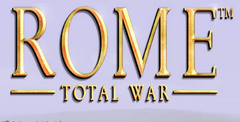
| a game by | Activision |
| Platform: | PC (2004) |
| Editor Rating: | 8/10, based on 1 review, 7 reviews are shown |
| User Rating: | 6.3/10 - 8 votes |
| Rate this game: | |
| See also: | Download Strategy Games, Top 10 Total War Games, Games Like Polytopia |
Activision was proudly showing off Rome's multiplayer aspects at the show, even though, currently, there's only one type of mode - kill everything and everyone that's not on your side, just like in single-player. However, you can have up to eight generals and four teams battling each other on a single map.
We tried out a two-on-two play test, first selecting our factions from a choice of 12, picking our troops -which we decided upon with our team mates to make sure we had a balanced force - and then arranging our armies on the battlefield.
Once hostilities commenced, we liaised over a voice communication system with our comrades, meaning we could converse without the eavesdropping scumbag enemy - who sat opposite - overhearing our plans. We agreed that he'd hold a solid wall of spearmen backed up by archers on a ndge in order to suck the enemy in, while we would wheel round the back of our opponents with the cavalry and decimate their unsuspecting forces.
It worked like a dream. The cavalry charges were staggenng, with horses flattening scores of enemies with their awesome impact and the game flowing more smoothly than malt whiskey at a Scotsman's birthday party. What's more, because the only information being sent from one machine to the next is the occasional order, online games are set to run every bit as smoothly as the seamless LAN games.
Download Rome: Total War

System requirements:
- PC compatible
- Operating systems: Windows 10/Windows 8/Windows 7/2000/Vista/WinXP
Game Reviews
Is There Anyone who hasn't bought this yet? Really? What have you been doing with your time? Well, you can fix that now. This is an opportunity for useless gamers such as yourself to pick up the last Creative Assembly masterpiece on the cheap before the brand-new Medieval II: Total War hits the shelves.
Rome: Total War is strategy perfection; the kind of game that Caesar himself would have played if he'd concentrated on inventing the personal computer rather than putting his profile on coins and being knifed in the back by Brutus.
Sort your faction's Roman troops out on the 2D Risk-style map before playing out the individual skirmishes on a 3D battlefield comprising of thousands of individually-animated units - so good that BBC2 used it in their TV programme Time Commanders. Rome: Total War is utterly compelling, insistently tugging at your trouser leg and pleading with big, blue, watery eyes to have just one more go. For the love of Zeus, grab a copy now.
Mesmerising. Cerebral. Intuitive. Epic. Breathtaking. A masterpiece. Rome: Total War is all of these things. In fact, I'm almost tempted to leave it at that and simply send you skipping off to the shops to pick up a copy, safe in the knowledge that in a few days your eyes will be weeping blood from monitor glare, bladder haemorrhaging as you succumb to that all-consuming urge to play for just half an hour more. Of course, I'm not going to do that. After all I couldn't do that to you after all we've been through now could I? Course not.
But I am going to continue along similar lines, as despite a few foibles, faults and Al glitches, Rome is almost beyond reproach. In fact it's no exaggeration to say that rarely, if ever, has there been an RTS that has so redefined its genre, so comprehensively swept aside the opposition, so utterly shifted the benchmark of quality, intensity and entertainment as Rome. It isn't just an improvement over its prequel Medieval, it's a quantum leap, another giant's stride up the road of RTS domination trod by developer The Creative Assembly since it released the groundbreaking Shogun: Total War in 2000.
A mere four short years later and Shogun's concept has evolved into an all-encompassing strategy game of warfare and intrigue, political machinations and personal advancement, subtle tactics and merciless brutality, melded expertly together to create perhaps the single most comprehensive, visually impressive and immersing war game ever imagined. Rome: Total War has finally arrived and it's ready to conquer all.
Despite its multitude of advancements though, Rome's core remains unquestioningly loyal to its predecessors. Just like Shogun and Medieval before it, Rome is split into two distinct sections. One, a turnbased strategy segment in which you move your armies around the game map in order to conquer new territory (encompassing Europe, North Africa and Asia Minor) - and in which you also deal with the finer points of running your empire. And two, a tongue-lollingly realistic real-time strategy battle section, where the game's true brilliance lies.
From the moment you first fire up the game and choose to command one of three Roman factions (Julii, Scipii and Brutii), to that distant day when your flag is unfurled in every corner of the known world to the delirious glee of your loyal Roman subjects, Rome: Total War simply oozes quality from every pore. A sea of possibilities awaits you, with each faction offering an almost infinite and wildly varying number of paths for you to trample down.
Wherever I May Rome
Playing as Julii unlocks the barbarian-held, tree-matted lands of central Europe where Germans, Britons and Gauls await with their wild painted faces and massed but disorganised armies. Brutii brings you immediately into conflict with the tactically adept and organised Greeks, while Scipii offers an open route to the sprawling desert flatlands of Carthage and Egypt.
Each side brings with it its own unique approach, and once you've completed the campaign with one of the above factions, you're then free to do it all again with any of the other major empires of the time, including Carthage, Egypt, Greece and the Gauls, meaning the game's replayability is higher than a drawn cup final's. But believe me, you're not going to be playing through the campaign as any of these other nations any time soon.
Newcomers will struggle to complete the Roman campaign on even the medium difficulty setting, though the hardened vets among you (if you're shaving yourself with a machete right now, that's you) will find this level a little on the easy side. My advice? Head straight for Hard'.
One of Rome's most instantly noticeable upgrades from Medieval is the turn-based strategy map. Instead of the flat, featureless 2D map of old, you're now treated to a visually striking, feature-packed landscape. Hills, mountain ranges and lush forests tower majestically before your armies, cities expand as you construct or upgrade buildings, and roads ferry seemingly never-ending lines of trading carts back and forth between your everexpanding web of towns and cities. You can also build shipping routes and even transport your armies from port to port by boat, though don't go expecting real-time naval battles as these can sadly only be auto-resolved on the strategy map.
Simply managing your empire is a game in its own right. Maintaining the happiness of your people while balancing the economic demands you make on them in order to fuel your war effort is as precarious as walking a tightrope strung with razor wire, while mastering the art of diplomacy can prove to be the difference between victory and quick, genocidal extermination.
Changing Romes
Promoting new generals and governors, satiating the bloodlust of your citizens with sporting arenas, maintaining just the right sized garrison in every town and city without leaving it open to revolt and making headway in the Senate are just a few of the nearcountless tasks and trials which await you. Yet, contrary to the lamentations of the cynics and mewling crybabies who think C&C: Generals is the height of strategic complexity, Rome still manages to remain charmingly accessible even to the wide-eyed newcomer.
Whenever you feel swamped, confused or lost you'll find an advisor just one small mouse click away who'll take you through /everything step by guided 3 step in intricate yet jf eminently understandable - detail. And if, after all this, you're still left gawping gormlessly at your monitor and scratching your head like a lice ridden baboon, then you can simply choose to have all of your cities auto-managed by the computer and concentrate on the all-important pastime of killing and conquering.
Holy Roman Empire
Just like the Vatican in Medieval, the Senate plays a major role in Rome. Needless to say, the slave boy-flanked Senators are not your friends, and your ultimate goal is to oust these festering lard-buckets and take control of the Senate - and ultimately Rome itself.
All in good time of k course, as first you have to gain influence and curry favour with the politicians by completing the Senate missions assigned to you. These generally charge you with either negotiating peace with or conquering a certain settlement, and while this may sound a mite basic -especially for fans of previous Total War games - these missions do help push you ever deeper into enemy territory, rather than hiding behind your city walls and consolidating.
Moving your armies around the map is quick and easy, though it can sometimes be hard to keep track of all of your armies once your Empire begins laying down roots in exotic and far off lands, and squinting at your monitor trying to identify isolated groups of troops in vast expanses of land can be both frustrating and fiddly. Another huge innovation dropped into the Total War mix since Medieval is the introduction of area-sensitive battle maps. Unlike Medieval, where each province had just one set battlefield - meaning you'd often repeat the same battle during the course of a campaign - Rome has an almost infinite number of potential bloodbaths.
In fact, the exact location on which your army stands on the strategic map when it attacks (or is attacked) is replicated in gloriously rendered 3D on the real-time battlefield. And if you have two armies in close proximity to each other, you get to control one while the computer takes charge of the other - though these Al generals are all too often guilty of being rather too laid back when it comes to backing you up, which can cause all sorts of problems if you're heavily outnumbered and relying on their help.
Rome Is Where The Heart Is
Right, that's the strategic map covered, which only leaves one thing. The battles. And you'll no doubt be pleased to know that we really have saved the best till last.
If you tuned in to watch BBC2's Time Commanders you'll be more than familiar with Rome's real-time battle engine. What you may not know is that the version used on telly is now getting on for two years old. Oh yes. Meaning? That the engine in the finished version of Rome is even more impressive than the one you've seen on the Beeb.
Take it from me. The first time you're transported to the battlefield you're going to feel a real rush of exhilaration. Vistas sprawl majestically to the horizon, streams meander through forests and in the middle-distance stand your enemies, countless in number, baying like animals and waving their weapons defiantly. Every soldier has an incredible level of detail, right down to the individual rings on their chainmail.
Preceding every battle is a speech from your army's general (generated on the fly from thousands of voice samples) in which he divulges important information about your enemies. These tactical nuggets can prove invaluable, often helping you to find the right strategy to outmanoeuvre your opponent.
But the true genius of these battles is the realistic tactics. Unlike the majority of RTS games where weight of numbers always prevails, Rome allows the canny general to forge victory from seemingly unwinnable situations, thanks to real-life battle dynamics and tactics. Every one of the hundreds of units on offer has a strength and weakness, a purpose and use that if utilised can turn the tide of a battle in your favour. Height advantage, flanking and use of combined arms are all essential skills to learn, while working out how to take advantage of an opposing army's weaknesses will make world domination an all-the-more realistic prospect.
Oh, The Humanity
Soldiers clash with merciless ferocity, thrusting, parrying, pushing, stabbing and jumping as they hack at their enemies. Cavalry and war elephants decimate petrified ranks of poorly defended foot soldiers, sending dozens carving through the air with their tusks. Men turn and flee in a desperate attempt to save their lives, only to be cut down by merciless horsemen as they run. And you now have even more time to enjoy these ocular delights, as the clunky control interface of Medieval has been dropped in favour of a more streamlined system that incorporates the tried and tested RTS drag-and-select mechanic.
And let's not forget the castle sieges either, which have also been revamped since Medieval. These are now titanic operations, with gates to be battered and walls to be scaled, while defenders rain down thick blankets of fire arrows (archers can line walls) and gallons of burning oil on invading armies.
With the thundering soundtrack embellishing the already feverishly high atmosphere, conflicts reach a level of immersion and brilliance never before sniffed at by an RTS, and not even the occasional Al glitch (confused troops: the odd clipping error) can mar the game's quality to any significant extent.
So there you have it, Rome is everything we'd wished for and more, an RTS so far ahead of the current competition that it must almost feel embarrassed by its utter dominance. No doubt it'll come under fire from those with unrealistic expectations, who forget that despite its brilliance, it's still a game - not a lifealtering experience - and feel aggrieved that it doesn't transport them back in time (literally), saddle them on a horse, stick a rusty scimitar in their hand and wipe their backsides with silken toilet paper as they lead a cavalry charge at quaking peasants. It's their loss.
As a simulation of warfare and politics, tactics and economy there is no equal to Rome. It may be daunting in places and display the (very) occasional rough edge, but for the most part it's exceptional. My advice? Milk every ounce of enjoyment, every droplet of fun you can from it, because unless The Lord Of The Rings: The Battle For Middle-Earth comes up trumps, we may not see another strategy game of this quality for a very, very long time to come.
Et Tu, Brute?
We Don't Need No Civil War
Unlike in Medieval and Shogun, where the final third of the game was a foregone conclusion, Rome has one last surprise up its sleeve when you start getting a little too powerful for the Senate's comfort.
As soon as your Empire is deemed too much of a threat, the Senate will order you to take your own life. Upon failing to do so, a civil war will erupt in which the other two Roman factions gang up on you and try to steal your dinner money - and your Empire. Well, we never said it was going to be easy did we?
Jump In The Fire
Campaigns Are For Wimps...
If you don't fancy the idea of spending weeks playing a campaign, then fear not, because Rome ships with eight cinematic and hugely taxing historical battles for you to pit your wits against. These range from city sieges where you batter down walls with flaming onagers (Roman catapults) to guiding a Roman legion to safety through barbarian-infested forests. There are also countless maps on which to contest custom battles, with up to eight spaces for either Al or human opponents/allies. War doesn't get much better than this.
From the mists they emerge, marching like one beating drum in columns of red and gold. Arrows streak down from the darkening sky. Siege towers roll towards crumbling walls, their creaking wheels thunderclaps of doom. Then, you fancy a cup of char, press escape and put the kettle on. Rome: Total War contains an inordinate amount of goodness - to label it as a mere military RTS would be an outright crime. History, technology, entertainment, unreliable drunken generals in your northern territories and heaps of bloody death make it the greatest PC game ever crafted in the British Isles. There's no strategically minded game studio that can currently match The Creative Assembly; Medieval II: Total War is good, but the grip of Rome will last as long as the civilisation it's based on. Or at least until the next game comes along.
I Have a dream. A dream where I can look down from a city's ramparts and spy a sea of baying warriors below, my ears pounding like war drums from their courage-sapping cries as I lead a last-stand defence of my empire. A dream where I can command thousands of warriors on picturesque battlefields against titanic enemy forces just by switching on my PC. and believe I'm actually there. Come autumn, that dream could be a reality with Rome: Total War.
In a recent world exclusive viewing we spent several hours touring the latest build of this stunning 3D RTS, guided by The Creative Assembly's studio marketing manager Ian Roxburgh, development director Mike Simpson and owner, founder and managing director of CA. Tim Ansell. What we found was quite simply the most ambitious and all-conquering RTS the world has ever seen. Preoare to be astounded.
First off, Ian introduces me to the three Roman factions available for the campaign. "To start with, you can play as either Scipii, Julii or Brutii. Each has a slightly different playing style. Julii will tend to move north into the Gaul territories and mainland Europe. Brutii are more lukely to come into contact wfth the Greeks and Macedonians, while Scipii will tend to move down towards Carthage, Africa and Egypt." But with the game featuring some 21 factions in total, why only the choice of three? "Once you've completed the game with one of these, you'll unlock all the other factions," reassures Ian, perfectly reading my worried expression.
Your choice of faction will also influence your dealings with the Senate. Similar to the Pope in Medieval, this collection of massively influential lard-arses will provide you with missions, such as overrunning a Gaul settlement or assassinating an enemy general. Complete these and your influence and leverage with the white toga-wearing bores will soar, putting you in an excellent position later on in the game when you attempt to take sole control of the Senate and install yourself as emperor of Rome.
Senate missions should also prove useful to newcomers intimidated by Rome's radically freeform nature. As Tim Ansell explains: "They give you a bit of direction, so if you want to just follow these preset missions, you can." It's this Creative Assembly's commitment to making Rome accessible to every type of gamer, as it creates a title promising near-infinite complexity, yet instant playability. Further evidence of this comes when Ian tells me that Rome is being geared towards a minimum spec of a Pill 800 - a staggeringly low system requirement for a game where every single unit is rendered in glorious 3D and boasts a complex array of Al scripts under its gleaming battle armour.
Take Your Turn
So onto the turn-based campaign map. Whereas its predecessor's map had a number of featureless 2D provinces with just one battlefield, Rome has received a complete overhaul that'll bring a totally new strategic dimension to the series.
For starters, the map has been utterly transformed, with beautifully rendered 3D landscapes reflecting their real-life regions and buildings sprouting up from the ground as you build them. Majestic, snow-capped mountains roll across southern Europe, morphing into lush, dense forests as we move up into central Europe and Germania. To the east, arid sand dunes stretch over vast intimidating swathes of land, while Scandinavia looks flatter than an ironed pancake. Volcanoes smoke menacingly, while tides lap the shores gently, belying the sea's slumbering power.
Watch It Blow
As Ian moves the game forward a few turns, the Volcano starts to smoke more violently, then slowly, gradually, begins to erupt, molten rocks propelled into the air with unearthly force, crashing down and devastating nearby cities. As our tour of Europe, North Africa and Asia Minor comes to an end, Ian explains that floods and famine will also blight you, depending where you are on the map. As if world domination wasn't hard enough already.
Probably the campaign map's most radical overhaul involves regional troop movement. Unlike in Medieval, you can now move armies within each province, placing them on hills or hiding them in forests to set up ambushes for any opportunist nation that fancies having a go. This troop positioning will also determine both your starting deployment and the layout of the battlefield when the game switches to 3D RTS mode. All of the campaign map's geography will also be present on the actual battlefield.
Thanks to this new deployment feature, there's now a near infinite amount of battlefields for you to fight on - avoiding the repetition suffered by Shogun and Medieval - meaning your battle tactics will need to be even more diverse. "If you're facing the Greek phalanxes which need flat terrain to be effective, you can go out of your way to make the battle difficult for them by keeping your troops on the high ground," explains Tim, now settled in his chair.
Calm Before The Storm
With time moving on and with my constant bleating pleas to watch an actual battle finally paying dividends, Ian quickly explains about the campaign's two distinct sections as he loads up a desert encounter. "When you control a certain amount of the map, the second half of the game will kick in and there'll be a civil war where the other two Roman factions turn against you and the Senate will try to bring you down a peg or two. So not only will you be trying to maintain your empire, you'll also be fighting against the other two Roman factions." It's clearly a brave and innovative idea, one that will ensure you're challenged from the very first skirmish, right up to the game's final titanic confrontation.
But at last, it's time for a fight. This is what I've been waiting for, shuffling in my seat impatiently as Tim, Ian and Mike watch on in amusement. Let battle commence.
Death In The Desert
It's morning, but the sun is already high, peaking out over the nearby pyramids and bathing the barren landscape in a deep yellow hue. To our right, three legions of regal cavalry await orders in perfect formation, banners flying high, riders at the ready. To our left, praetorians are lined behind pilum-toting javelineers, and at our rear archers examine their bows.
We can see the Egyptians in the distance, trails of dust betraying their approach, massed ranks clearly outnumbering our own. Our commander, turning to his men, begins shouting words of encouragement, a rousing speech that perfectly portrays the situation we find ourselves in. A war cry pierces the silence.
With that, we send our cavalry wheeling away, double-clicking on their lead formation so we're riding with them, sitting on their shoulders - a stunningly cinematic viewpoint - as the music changes to a pounding Egyptian war song. With one mouse-click we swing back to the main force, giving the order for them to advance on the enemy. We can see their covered faces now, hateful eyes peering out as they bay like animals and surge forward. Our archers let loose a volley, arrows stopping many of them in their tracks like an invisible force field. Some get up groggily and rejoin the charge, only to be met by a hail of pilums thrown by our spearmen. More of them drop.
With the Egyptian ranks disorganised and stunned by our projectile onslaught, our men draw their short swords and prepare for the final push. Using Rome's multiple formation select feature, we highlight our entire force and direct it towards the heart of the enemy, and watch as our men intelligently fan out to avoid the kind of bottlenecking which so often blighted Medieval.
Blood And Thunder
The impact of the two armies is sickening. Zooming right into the fray, troops battle one-on-one, thrusting, parrying, countering, pushing and stabbing at one another, every man possessing individual stats and Al, as well as 12 motion-captured attack and defence animations as they scrap.
But victory is not yet certain, and, reluctant to leave our main force, we set our still-circling cavalry auto-control - again a new feature - a trusted Al lieutenant told to take the horses round the back and flank the Egyptians.
The enemy are falling like wheat at harvest time, but their sheer weight of numbers is beginning to encircle our smaller yet superior force, and the battle suddenly looks like it could be lost. Right on cue, the storm of hooves on sand rises in the desert and we pull back the camera in time to see our three Al-led cavalry legions crack into the Egyptian rear, causing a shockwave of such ferocity that their ranks are cut in two.
The battle is clearly won, but we've seen enough and Ian presses the quit key and uses the new mid-battle autoresolve function to calculate the closing stages of the battle. Victory is ours.
Rally The Troops
"You could be looking at battles of up to 48,000 troops in an eight-player multiplayer game and around 4,000 on a minimum spec machine," explains Tim, breaking the silence as I sit dumbfounded.
Time now for a siege battle, and while Ian sets it up, Mike takes me through some of the game's new units, which include flesh-ripping war dogs, elephants that send enemy troops flying through the air with just one flick of their tusks, man-chopping chariots and of course pilum throwers. Best of all, though, are the incendiary pigs - tar-covered bacon rashers on legs which are set on fire and let loose on nearby elephants, their agonised screams terrifying the big-eared beasts and causing them to flee in fear. Inspired.
Ian's ready, and our attention turns again to the enormous wall-mounted widescreen monitor, which I'm secretly planning to conceal in my pants when I leave. On screen are 5,000 Roman soldiers attacking a Carthaginian fortress, their onagers (catapults) hurling rocks at the buckling stone battlements, while horrifyingly life-like ballistas impale dozens of the defending archers lining the walls.
As the Carthaginians start to crumble, the Romans bring forward their battering rams, siege towers and ladders, climbing up to engage the defenders across the entire breadth of the fortress. It's not long before the gates burst open and the attackers flood in, the two armies embroiled in vicious street combat. It's a truly awesome sight to behold, akin to Return Of The King's 'Battle of Minas Tirith', only with Romans doing the fighting instead of orcs.
As far as we can make out, Rome is a masterpiece in the making - an RTS unparalleled by any immediate competitor. And with the game all but finished and currently being crammed with as many extra features as The Creative Assembly can put in before it ships, it's likely to be even better come autumn. What say you we skip spring and summer this year, hmmm? After all, who needs the sun when you've got Rome: Total War?
The Art Of Diplomacy
If You Can't Conquer It, Bargain For It
While Medieval was a cracking game, it wasn't without its faults - a fact that CA is eminently aware of. Diplomacy was one such weakness, often proving too inflexible, clumsy and confusing - especially for newcomers. However, as Ian Roxburgh points out, these problems will soon be a thing of the past. "We've created loads of different options for making diplomatic offers and demands. You can even promise not to attack someone if they give you a certain amount of money. Every asset in the game will be tradeable too and you'll even have the option to set up protectorate states that pay you to look after them."
However, renege on your deals and your reputation will plummet into the gutter faster than a posh daddy's girl caught in the act in a hotel room. Of course, you can always just take everyone's money and wade in with your armies anyway if you like, because as CA's founder and MD Tim Ansell says: "Who needs to be trustworthy when you've got big armies?" Damn straight.
Few Strategy games are so good they get mainstream TV shows based on them. In fact, before it's even been released, Rome: Total War, is probably the sole claimant to such a title. But if you thought the engine on BBC2's recent Time Commanders series looked awesome, the news from the Total War camp is that you ain't seen nothing yet. What you'll be watching on your PC later this year will leave the show in the shade.
Time Commanders uses a version of the game that will be a year old by the time it's released, says Mike Simpson, development director at The Creative Assembly. That year is being spent on polishing the game. The general gameplay, user interface, Al and visual appearance are improving almost daily. Every time a new feature goes in, we all crowd round whoever's desk and grin."
Fear Factions
You'll be able to play as a number of factions, including the Carthaginians (think Hannibal and his elephants), the Egyptians (think Cleopatra and the Pharaohs), and barbarians such as the Gauls (think those guys getting their arses kicked at the beginning of Gladiator). But it seems that commanding the Romans themselves will offer the most variety.
The eventual aim of the Imperial Campaign is to become emperor," says Mike. But apart from conquering, you'll be guided by the senate, who'll give you short-term goals and reward you for achieving them. To help you get to grips with the kind of sprawling campaigns that unfold in Total War games, Creative is implementing an advisor' feature that promises to be a whole lot more than a bunch of context-sensitive text balloons. Mike explains: The idea is that the advisor uses the game Al to look at what you're doing and provide intelligent suggestions on how to play the game. In some cases, if you want, he'll even do it for you. So between that and the options to hand over responsibility for various things to your minions, people who might not normally be interested in a deep and complex game like Rome can play it easily, and play it well. It'll open up the game to a much wider audience."
Divisions Of The Spoils
This delegation principle has also been taken on to the field of battle. You can control the exact movements of units, or divide your army into divisions, put captains in charge and give the divisions orders like take that hili' or attack the centre'" explains Mike.
Your troops have more unit-level intelligence, and you can let them organise themselves locally. They'll automatically turn to face the enemy and change shape and position to link to units on either side to present a solid line. To organise battle lines, simply dump units in vaguely the same area -they'll sort themselves out. But if you want precise control, you still have it."
We also pressed Mike about multiplayer options, hoping for more scope than in previous Total War titles. There won't be a multiplayer campaign using the full single-player campaign game - the games would take so long it's just not practical. We're looking at the option of a massively multiplayer campaign with a simpler feature-set where players join a faction and play when they like. No promises yet..."
And if all that isn't enough to whip you into paroxysms of excitement, then it's time to hang up your mouse and hotkeys list and go home. Rome: Total War is almost guaranteed to be awesome, so start drooling now.
I've always been a huge fan of strategy games both turn based and RTS but somehow I missed the boat on the Total War series until now. Rome: Total War is without a doubt one of the best strategy games I've played. Activision has successfully combined full RTS and turn based genres in one game while maintaining the balance between them, putting any serious strategy fan to the test.
If you're new to the series like I am, it may take some time to get accustomed to the different aspects of the game. There is a decent tutorial that can be played that walks you through both the battle (RTS) system and the map (turn based) system. The tutorial is more then adequate to get you ready for the first campaign but there is a lot to get your arms around.
Once you get started, the map system is where you'll begin. The map system is where the cities are managed, armies are created and moved, and the politics of the game take place. This really could have been a good foundation for a game in itself as there are numerous aspects that would keep fans of turn based genre games engaged for some time. Besides the expected elements, other concepts enhance the strategy possibilities. The position armies are in for instance effects how the battle is fought, as ambushes are possible and even the strategic placement of the army should be considered before engaging. In addition, armies can be combined, a city can be put under siege, you'll watch your family grow to become generals or governors and even be killed, and many other options that all create a dynamic experience. You can even let the computer run the battles and give you the outcomes, but I doubt that option is used much.
If you do engage the battles, you're in for quite a treat. In addition to the graphics being extremely impressive detail-wise and the sound effects immersing you into the battlefield, the units are something to behold as well. Watching the cavalry charge into an infantry with the sounds of the hooves pounding the ground for instance just doesn't get old as infantry are basically trampled and thrown when the horses come barreling through. However, if you try that same maneuver on pikemen, the results are slightly different. There are numerous different types of units available from archers to siege equipment and each has special attacks that can be employed. Those units can also be grouped together and set to different formations, as the battle requires. You'll find they can get winded, discouraged, and even try to break ranks if the battle starts to go south. A good general (you) can refocus his troops in addition to making numerous battlefield decisions as victory can come from many different paths.
Rome: Total War creates an experience that can be played again and again and even offers a solid multiplayer option online. It is an in-depth game however, so if you expect to sit down and start playing you may be frustrated. For those who are into strategy games or anybody who is patient enough to learn the system however, Rome: Total War will probably stay on your PC for some time.


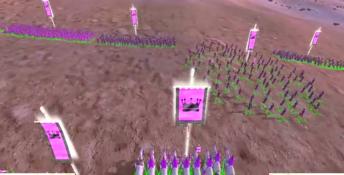
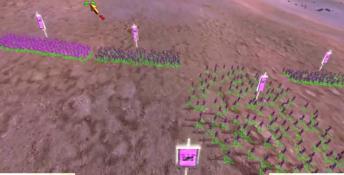
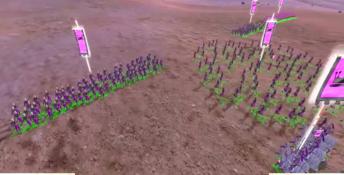
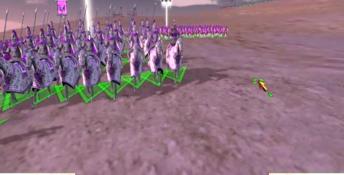

















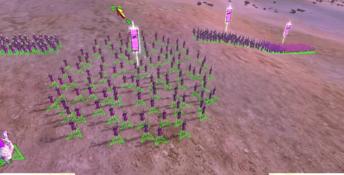

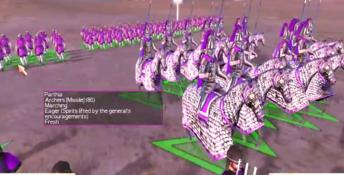
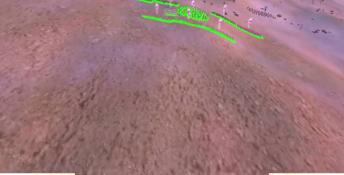
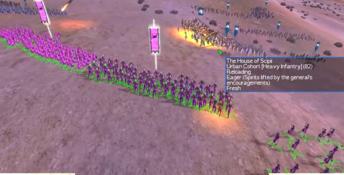
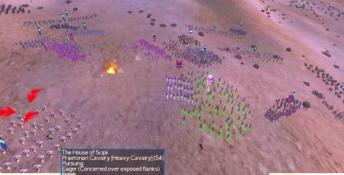
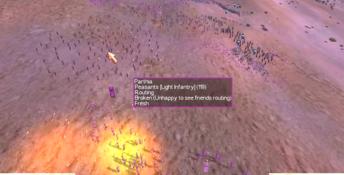
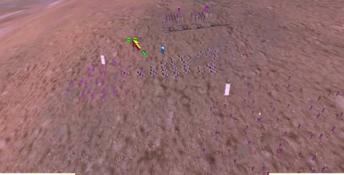

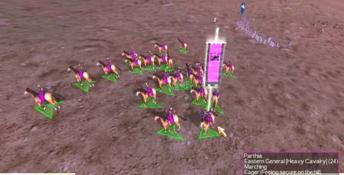
 Shogun: Total War - Warlord Edition
Shogun: Total War - Warlord Edition Space Colony
Space Colony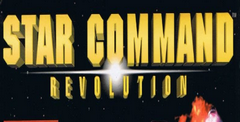 Star Command: Revolution
Star Command: Revolution Star Trek: Away Team
Star Trek: Away Team
 Uprising
Uprising
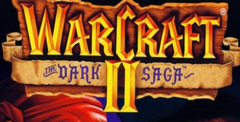 Warcraft 2: The Dark Saga
Warcraft 2: The Dark Saga
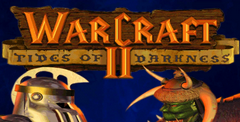 Warcraft 2: Tides of Darkness
Warcraft 2: Tides of Darkness
 Warcraft III
Warcraft III